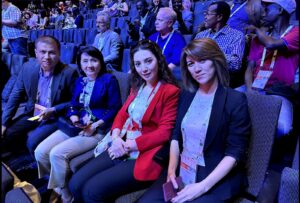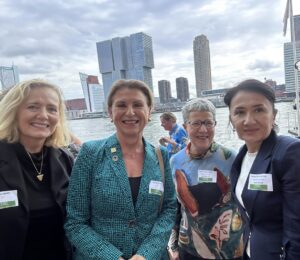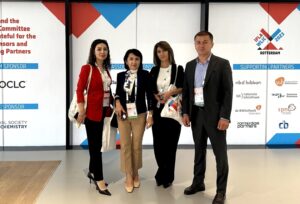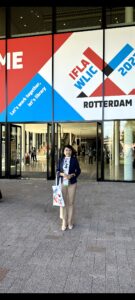IFLA WLIC 2023 in the Netherlands and attendance of Uzbek librarians
23 October 2023
The field of librarianship in Uzbekistan has its own history, a strong place in the life of our people, and a great mission. At this point, we can say that librarianship is developing rapidly today. It’s not just an increase in numbers, but we can see and observe that the libraries are being improved and updated. Anyone who has looked at the National Library, the regional information-library centers, the completely updated Republican Children’s Library, and a number of information-resource centers under the Ministry of Higher Education will understand this. I would like to emphasize that all opportunities have been created for the development of libraries in our country. This is primarily reflected in the legal and regulatory documents signed for the regulation and proper organisation of the library sphere. In the first 15 years of Uzbekistan’s independence, one Law, two Presidential decrees, and two Cabinets of Ministers decree were passed, and in the past 5-6 years, three Presidential Decrees, five Presidents and six Cabinets of Ministers decree were also passed. All these documents serve as a legal basis for further development of the information-library sector. The effectiveness of these decrees is the ability of experts in the field to correctly understand major changes and transformation processes. Besides, it requires the cooperation and support of leaders at all levels, the correct assessment of the changing reality of society and decision-making, and librarians require knowledge, activity, entrepreneurship, acceptance and assimilation of news, flexibility, and new thinking.
It is one of the primary tasks of the library management to show, acknowledge and announce to the world library community the state of the information and library sector in our country and the changes being implemented. Our membership in international librarianship institutions and organisations allows us to make many innovations in the library field. In addition, through the International Federation of Library Associations and Institutions (IFLA), our employees participate in congresses, conferences, practical seminars and various studies, training and exchange of experience.
The last days of August this year were very exciting and full of news for the librarians of the world. On August 21-25 in Rotterdam, the Netherlands, the 88th General Assembly of the IFLA opened an international conference under the slogan “Let’s work together, let’s library” and the delegation of Uzbekistan took part in it. I would like to emphasize that this year’s events were significant and joyful as they were organised in the country where IFLA is headquartered, the Netherlands.





This event brought together directors and specialists of libraries, information centers, publishers, book sales and subscription agencies, educational institutions, museums, archives in a prestigious conference. Rotterdam hosted librarians for 5 days, because 90 percent of the events were organized in the Ahoy conference center. There were events such as exhibitions, discussions, debates, meetings, talks, workshops, presentations and so on.
About 3,000 offline delegates from more than 100 countries participated in the opening ceremony of the conference. At the opening ceremony were remarkable keynote speakers such as Rotterdam’s Vice Mayor Alderman Said Kasmi, IFLA President Barbara Lison, Secretary of State Gunay Uslu, Minister of Education, Culture and Science Robbert Dijkgraaf, the Dutch National Committee Chair Theo Kamperman, IFLA Secretary General Sharon Memis, and her Royal Highness Princess Laurentien of the Netherlands who sent greetings. The Opening Ceremony was conducted by Master of Ceremonies, Jermaine Berkhout, and included two moving performances by Rotterdam’s own Conny Janssen Danst.
IFLA in cooperation with the Danish programming company Systematic has been holding the “Public Library of the Year” competition annually, and the winner will receive a cash prize of 5,000 US dollars. This year, 16 libraries from 11 countries participated in the competition. The finalists were the Parramatta Library at PHIVE in Australia, the Shanghai Library East in China, and the Janez Vajkard Valvasor, library in Slovenia. The Gabriel García Márquez Library in Barcelona, Spain was announced the winner of the IFLA/Systematic Public Library of the Year Award 2023! As a fan and reader of Marquez, we were very happy about it. The library is an architectural and functional marvel that resembles an open library and serves as a central social hub for its 240,000 residents. It focuses on education and social interaction. With a focus on education and social interaction, the library offers workshops in creativity, languages and digital literacy. With an auditorium for children and youth, a radio studio, a cooking workshop and many other such unique facilities, the library covers a wide range of interests and experiences. According to the UN Sustainable Development Goals and IFLA’s Global Vision, the Gabriel García Márquez Library embodies a holistic approach to sustainable development, community engagement and knowledge empowerment. Through its commitment to design, environmental and social responsibility, it serves as a source of inspiration for libraries around the world.
On August 22, a meeting of the “Conference of Directors of National Libraries” was held. Directors of 61 National Libraries of the world took part in the meeting. It was led by Marie-Louise Ayres, and Lily Knibbeler, director of the National Library of the Netherlands. We heard insights into the work of regional national library associations from the Association of Ibero-American States for the Development of National Libraries, the Conference of European National Libraries, the Conference of Directors of National Libraries Asia and Oceania, and the African Library and Information Associations & Institutions National Library Section. We also listened to presentations by Dr Pauline McBride, Honorary Teaching Fellow at the University of Glasgow School of Law, on the topic “Artificial Intelligence in National Libraries: Leadership Challenges and Opportunities” and Isabelle Nyffenegger, Head of Services and Network of the National Library of France presented on the topic “Things to consider when implementing AI into your library as a library leader”.
The leaders of the regional commissions stated the following: many projects are being implemented in the libraries of European countries. They are maintaining traditional activities and progress, increasing the prestige of libraries as educational institutions, constantly improving the skills of employees, working in constant cooperation, and expanding this direction.
In the activities of the libraries of African countries, , what was emphasized was the integration of the national libraries in Africa, the proper implementation of their activities based on the model documents of IFLA, the expansion of libraries in the region, and the fight against illiteracy in the country. Meanwhile, the Head of the Asia and Oceania Regional Commission shared that they hold online and offline meetings with libraries in the region. “Smart library” projects were also one of the issues on the agenda, that is, to rely on the help of new technologies, such as the introduction of artificial intelligence into the life of libraries.
At the end of the event, the directors of the National Library were divided into groups and asked, “If you could instantly become an expert in something in your Library, what would you choose and why?”. I talked with representatives of the National Library of Great Britain, Germany, Singapore, and Canada. I discussed the following issues with colleagues:
- copyright and privileges granted to libraries (if any) in its use;
- legislating the provision of information-library resources with an electronic mandatory copy to libraries;
- privileges and restrictions on the use of rare publications and manuscripts that have become public property;
- increasing the future role and prestige of the librarian profession;
- exchanged opinions on training and retention of librarians in the field (lack of specialized librarians, incapacity) and other similar issues.
The National Library of Uzbekistan participated in the IFLA poster competition for the first time. After all the requirements were fulfilled, the poster of the National Library of Uzbekistan was allowed to participate in the poster contest in the exhibition hall of the IFLA congress by the organising committee. More than 1,000 libraries participated in the competition online, and 197 of them participated in in strict compliance with the requirements set by the organising committee.
On August 22-23 there were two poster sessions, where those who visited the corner of Uzbekistan were given information about the poster and our projects. The main goal of the competition is to show the activities of libraries in the promotion of books and reading, and thus to promote and share these experiences on a global scale. We were pleased to show how The President of the Republic of Uzbekistan Shavkat Mirziyoyev pays attention to librarianship and reading, book publishing, translation, and supports authors in our Republic.
The winners of the competition were judged by the audience attending the conference and members of IFLA’s board of directors. The “Best IFLA Poster” winner was “Open Your Digital Library!” by Jessica Wevers and Ron Hall from the Netherlands and the winner of the “People’s Choice Poster 2023” as determined by the audience was Nor Chempavan Mat Abu and Mohamad Haniff from Smart Solat Raji Tun Uda Library in Malaysia.
On August 23, the IFLA General Assembly held a meeting. It contained a report on the general activities and financial activities of 2022-2023. The agenda includes the opening ceremony of the General Assembly, installation of voting counters, establishment of quorum, adoption of the agenda, minutes of the previous meeting held in Dublin 2022, commemoration of IFLA members who have died within the year, President’s report, IFLA Secretary General’s annual report, IFLA Treasurer’s report, award ceremony, address of the newly elected President, proposals, and decisions. The meeting included a presentation by Barbara Lison on the activities of IFLA during her presidency. IFLA’s financial report was also presented.
Each IFLA member has the right to vote and participate in the General Assembly’s proceedings. We participated and voted on the IFLA’s financial report, the candidacy of the newly elected president of the organisation and to hold the General Assembly meeting in Dubai in 2024.
The IFLA Exhibition was organised at the Rotterdam Ahoy Conference Center, where 65 international business and trade organisations demonstrated their products and services along with the IFLA WLIC 2023 booths throughout the week.
Similar to the professional program of all major international events, a cultural evening was held at Rotterdam’s Blijdorp Zoo. The zoo was open for the participants of the event after the regular opening hours and we, the delegates, enjoyed seeing polar bears, giraffes, bison, various butterflies and many other wild animals. We were delighted with the cultural program organized in such an unusual place. In a word, it reminded us of childhood as we got up close with fauna!
I can write a lot of things about the largest, most prestigious international event in the field of librarianship, which lasted for 5 days. After each business trip, it is natural to have new ideas, new views, and a new approach. What are our plans after IFLA WLIC 2023? Let me share these with you:
- To invite IFLA President Vicky McDonald to the international conference “Central Asia 2024. Internet and information-library resources in science, education, culture and business.”
- To introduce the membership of the National Library of Uzbekistan to OCLC and thereby to enter the bibliographic records, annotations and full-text data created in our libraries into WorldCat, and to acquire bibliographic records from the Online catalog, thereby including publications imported from abroad (Japanese, Korean, Chinese, Arabic, Dutch and many other) to achieve error-free inclusion in our electronic catalogs.
- To participate in the Poster Competition at the IFLA WLIC 2024 Dubai event.
- To establish of bilateral cooperation with the libraries of IFLA member states of Asia and the Pacific Ocean region.
- To participate in the IFLA international journal with articles on the information-library sector in Uzbekistan, the activities of the National Library of Uzbekistan named after Alisher Navoi.
- To strengthen (online) cooperation of the National library of Uzbekistan for active participation in IFLA’s “Acquisition and Collection development” section.
- To implement organisational work on the study of “IFLA vouchers” payments used in the exchange of international interlibrary information-library resources and establishing their use within the framework of the legislation of Uzbekistan.
- To study the conditions of participation in the “Public Library of the Year” competition organised by IFLA and to plan the participation of the libraries of Uzbekistan in the future.
- To implement work on the membership of information and library institutions of Uzbekistan in the international organisation of IFLA, their active participation in the activities of IFLA and expanding their participation in international conferences.
If all librarians are united and work together to fulfill these plans, the difficulties would become easy, there would be many innovations, the field would grow, our people would thrive, and our duty would be fulfilled. With lofty ideas and bright hopes, we are now starting preparations for the “IFLA WLIC 2024” projects which will be held in Dubai.
Contributed by Umida Teshabaeva, Director, National Library of Uzebkistan